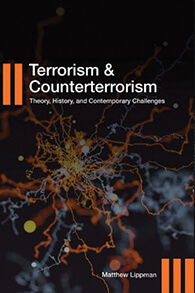Book Review: Terrorism and Counterterrorism
Terrorism and Counterterrorism: Theory, History, and Contemporary Challenges. By Matthew Lippman. Cognella; cognella.com; 374 pages; $94.95.
 It is increasingly challenging to write an excellent survey based on the literature on terrorism, given the massive proliferation of books and articles on the subject and the continuing evolution of the threat. But Matthew Lippman has met the challenge in Terrorism and Counterterrorism: Theory, History, and Contemporary Challenges. He provides readers with well-written and effectively organized coverage of the major topics that form the corpus of terrorism studies.
It is increasingly challenging to write an excellent survey based on the literature on terrorism, given the massive proliferation of books and articles on the subject and the continuing evolution of the threat. But Matthew Lippman has met the challenge in Terrorism and Counterterrorism: Theory, History, and Contemporary Challenges. He provides readers with well-written and effectively organized coverage of the major topics that form the corpus of terrorism studies.
The author provides insightful presentation and a succinct discussion of topics ranging from the complex task of defining the nature of the threats and acts of terrorism to the different types of terrorism. He also presents a solid assessment of the role of the media and the impact of the “new media,” which involves the “physical conflict on the battlefield and the ideological conflict on cyberspace.” This section deals with developments that are often missing from early texts on terrorism.
Chapters 10 and 11, “The Legal and Historical Basis of Homeland Security” and “Counterterrorism,” not only address the myriad organizations that are responsible for protecting the country from domestic, foreign, and transnational threats, but also raise fundamental questions associated with how a democratic order needs to reconcile national security with individual rights and due process. Lippmann’s trenchant discussion of such sensitive topics as the role of military commissions and such issues as the right to privacy versus the requirements for surveillance are cogently discussed. Such hot-button issues as measures associated with migration and immigration are also covered.
In the concluding chapter, “Donald Trump and Contemporary Terrorism,” the author notes: “The chapter offers a brief overview rather than an in-depth discussion.” It can serve as a basis for integrating the material from previous chapters to enable a class to critically and objectively assess policies and actions on countering terrorism.
While the book is essentially a textbook, it can provide a solid foundation for those who will be entering the security profession and practitioners who want an overview and an extensive and helpful bibliography on a subject that they may need to address.
Reviewer: Dr. Stephen Sloan, professor emeritus, University of Oklahoma, is a member of the ASIS Global Terrorism, Political Instability, and International Crime Council.